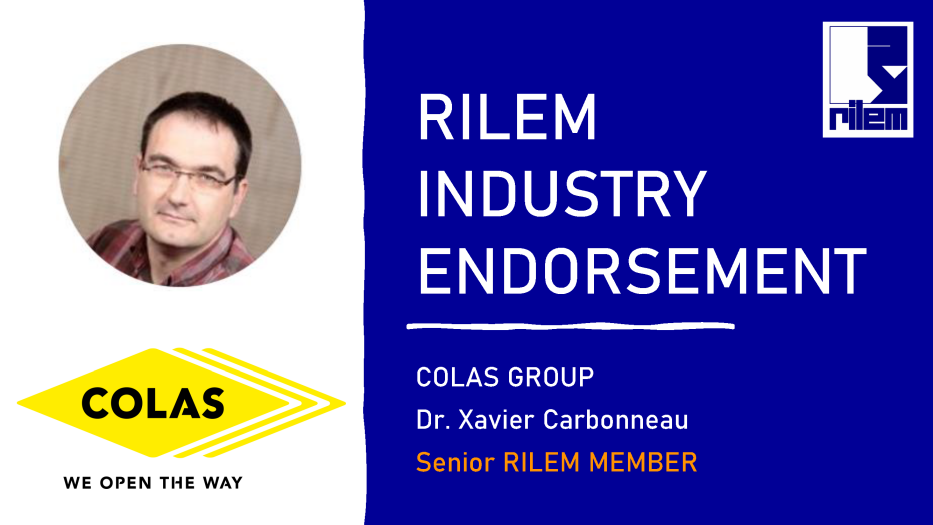News

Industry endorsement from Colas Group
Dr. Xavier Carbonneau is Project Manager at the Campus for Science and Techniques (CST), Colas Group, in Magny les Hameaux, France. Dr. Carbonneau has been a RILEM senior member since 2016. He has been active in several RILEM Technical Committees (TCs), such as 264-RAP: Asphalt Pavement Recycling, 272-PIM: Phase and Interphase behaviour of bituminous Materials and FBB: Fingerprinting bituminous binders using physico-chemical analysis.
The Colas Group is a world leader in the construction and maintenance of transport infrastructure. Its mission is to design, promote and build infrastructure solutions for sustainable mobility. Its three main business segments are Roads, Materials and Railways.
The statement below has been provided by Dr Carbonneau as a testimony of his experience in RILEM as an industry representative.
**********************************************************************************************************************************************************
To be involved in RILEM is a very efficient way to interact with international experts involved in the same research activities that the Colas Group focuses on. In particular, my colleagues and I are informed about and kept updated with the new techniques that scientists, and academics, in general, are working on. It is an invaluable survey of the state of the art of any specific research topic.
Another important benefit of being a RILEM member is access to the pre-standardization work done by the RILEM TCs and their Task Groups (TGs) through round robin tests. For Colas, it is crucial to have this information. Standards are our daily tools to qualify our products and to assess their performance. So, we want standards that are easy to use: not too complicated, not too expensive. Sometimes it is not easy to find all these characteristics in a standard. A new standard means investment in equipment and training of our people to be able to perform the test. Furthermore, we have to be prepared to adapt for possible changes in the world of standards. Sitting in a TC gives us the possibility to compare our results with the findings of other laboratories and consequentially to be more confident in the skill of our teams, especially when, for some specific tests, reproducibility data are scarce.
Finally, it is important to highlight that work is conducted on a voluntary basis by all the TC members. For the round robin tests to be accurate, all involved laboratories should work on the same materials or samples. This is something that might be complicated as certain university laboratories do not have enough quantities of raw materials to share but could be abundantly available with us. We can easily be involved by making samples in large amounts and distributing them. That is more of an “in-kind” rather than technical contribution but can help researchers of our TC to work on the same product material and can definitively improve the quality of the results. At Colas, we can sometimes spend time in the analyses of the results. This type of technical/scientific contribution is something that most of the people from industry would like to do more but unfortunately our priorities are often somewhere else and we do not have enough time for such activities.
















No comment
Log in to post comment. Log in.